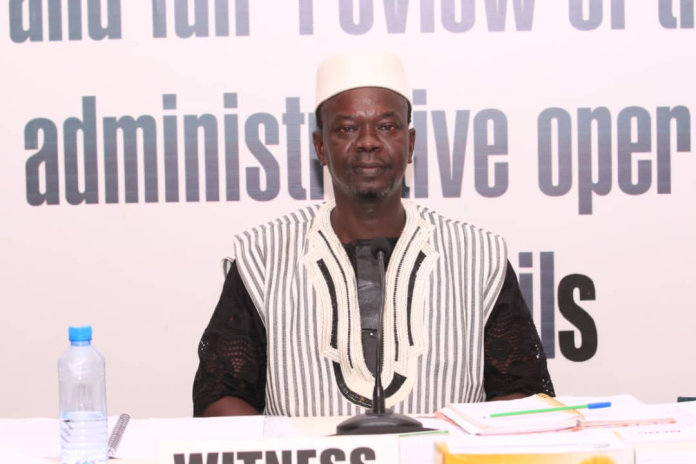Momodou Camara, who served as the director of finance at the Banjul City Council (BCC), during his appearance before the Local Government Commission of Inquiry offered a sobering account of his time in office, describing an environment where political actors eclipsed administrative authority, where internal controls were weak or absent, and where staff morale and capacity were critically low. The commission was established to conduct a holistic review of the financial and administrative activities of local councils from May 2018 to January 2023.
In his testimony, Camara spoke at length about a memo concerning the €3.1 million Banjul-Ostend partnership, a European Union-supported project aimed at supporting infrastructure and governance in the capital. At the center of the issue was a communication breakdown. Camara recalled that he was cautioned against copying external partners like Ostend on internal correspondence, prompting questions from Lead Counsel Patrick Gomez about why key stakeholders were being excluded from project communications. “Without Ostend,” he conceded, “you cannot go on with this project.”
The discussion then shifted to deeper concerns about governance. Camara testified that the council’s chief executive officer, Mustapha Batchilly, was largely absent from decision-making, saying, “He appears physically, but in essence—no input, no impact, nothing.” This vacuum, he said, allowed the mayor and her advisor, Makumba Sane, to consolidate control over both the political and administrative wings of the council.
“The administrative arm of council is dead,” Camara stated bluntly. “It’s poorly staffed, poorly managed, and lacks any checks and controls.” He said the resulting concentration of power in political hands had created a climate of fear and factionalism. Sane, he claimed, was the “most feared and powerful man in council,” accused of running a regime that divided staff into “pro-mayor” and “anti-mayor” camps.
Camara also spoke about a series of internal disputes that spilled into the courts, leading to costly legal battles. He pointed to a contested attestation process and long-standing feuds between political figures within the council. “We are always in court,” he lamented. “It’s costing the council millions.”
When asked about oversight of bank accounts, Camara indicated that the mayor wielded significant influence, noting a shift in the council’s primary banking partner following her election. “The pendulum swung,” he said, “from Trust Bank to BSIC Bank,” where he was told the mayor had been a “very good customer.”
On staffing, Camara described arriving to find a “skeleton crew” in the finance department, with key staff either absent or unqualified. He took steps to rebuild the department, he said, including creating an archive system, recruiting new personnel, and organizing financial records for the first time in years. “There were no vouchers, no documentation,” he said. “I knew if I was to survive in this terrain, I must go the extra mile.”
But his efforts often met resistance. Camara recounted rotating staff based on performance, only to have those decisions overturned by political leadership. In one case, he reassigned a staff member due to poor performance, only to be overruled after the employee appealed directly to the mayor.
Perhaps most troubling were revelations about revenue collection. Camara confirmed that Makumba Sanneh, the mayor’s advisor, had issued invoices alongside council staff and had significant involvement in licensing operations. “As far as finance is concerned, Makumba is present,” Camara said. “He serves the interests and observation of the Lord Mayor.”
Pressed on the legality of this arrangement, Camara said the system itself was broken, and that such informal practices were the only way things seemed to function. “If my new masters are telling me this guy is the revenue overseer, I’m not coming to fight,” he said. “I’m coming to contribute.”
“This is not how a council is supposed to function,” he told the commission. “There’s no separation of roles, no accountability—and in the end, it is the people of Banjul who suffer.”


















